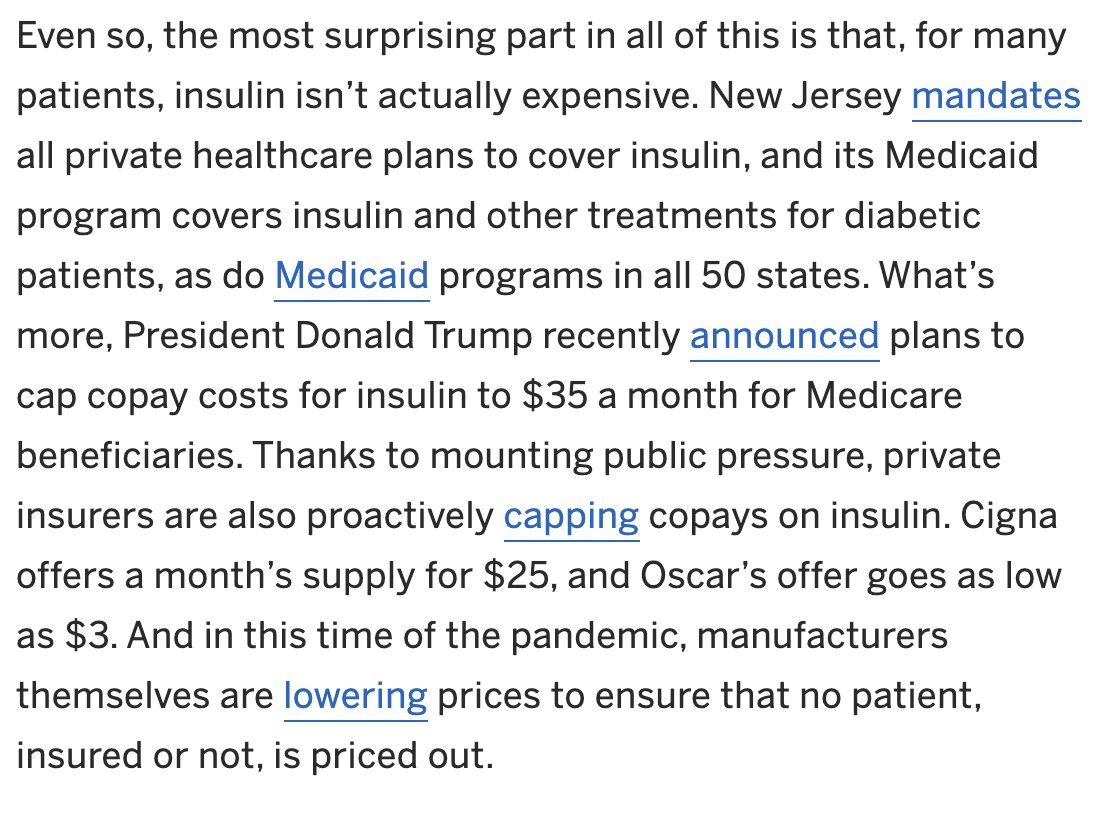This article is (correctly) getting crap for saying "only 12 patients died from insulin rationing - it's fine!", but there is so much more wrong with the article than that, both factually and morally. A thread: https://www.nj.com/opinion/2020/06/insulin-just-became-much-more-accessible-even-in-new-jersey.html
1. Perhaps the worst inaccuracy is "Competition drives down prices" w/r/t insulin.This is false.Insulin prices are not lower in Canada/EU/(ur fave county) because of competition. It's lower primarily because of collective negotiation (like M4A) and price capping.(2/)
Competition would lower prices somewhat in the US but not really. The article completely ignores things like patent evergreening, pay-for-delay, monopolistic supply chain relationships b/t manufacturers/wholesalers/PBMs. Loosening patent restrictions fixes very little of this(3/)
2. The absolute fucking audacity of statements like "people in need of insulin would do well to remember that there are already affordable options out there", then talking about Walmart insulin. First, Walmart insulin is not a suitable option for many (4/) https://www.washingtonpost.com/local/he-lost-his-insurance-and-turned-to-cheaper-form-of-insulin-it-was-a-fatal-decision/2019/08/02/106ee79a-b24d-11e9-8f6c-7828e68cb15f_story.html
Additionally, they cite "state of the art" insulins like Lantus.Lantus was invented in 1994.I was taking it at the turn of the century. It is not new.Other popular brands (humalog and novolog) have similar stories - 20+ years of barely any innovation(5/) https://www.biopharmadive.com/news/insulin-drugmakers-under-scrutiny-for-pricing-patent-practices/541275/
3. I can't even begin to analyze this bullshit word salad. The author's research couldn't have involved talking to anyone with T1D, because nobody with T1D describes insurance this way. Insurance companies have profitable relationships with Pharmacy Benefit Managers (PBMs)...(6/)
..that often only allow one brand of insulin to be priced affordably, and the "cheap brand" changes all the time. The author, generally, is painting a picture of an insulin market full of innovation and options, and this is simply not true. (7/) https://en.wikipedia.org/wiki/Prescription_drug_prices_in_the_United_States#Reasons_for_high_prices
4. Finally, the "only 12 die" quote. Aside from being completely heartless, it inaccurately presents the info. You don't generally die from "rationing insulin", you die from short or long-term complications from high blood sugar. Chronic high blood sugar can cause... (8/)
..heart/brain/kidney damage, and makes you much more prone to infection. None of these deaths would count as "insulin rationing" deaths per se, but they are products of insulin rationing.
In conclusion, oh boy this was a terrible article (9/9)
In conclusion, oh boy this was a terrible article (9/9)

 Read on Twitter
Read on Twitter



